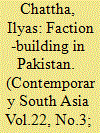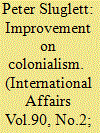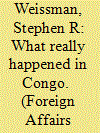|
|
|
Sort Order |
|
|
|
Items / Page
|
|
|
|
|
|
|
| Srl | Item |
| 1 |
ID:
133096


|
|
|
|
|
| Publication |
2014.
|
| Summary/Abstract |
This essay provides new evidence on local Pakistani politics in the immediate post-independence period. It reveals that far from being a period of national unity and service to the fledgling state, the country was mired in faction-building strategies between political rivals, competing for power and scrambling for resources, with debilitating consequences for democratic consolidation. While the new sources - largely based upon the archival records deposited at the National Documentation Centre, Islamabad - provide material relating primarily to Punjab, this essay demonstrates that the tensions between central government and the provinces can only be comprehended by reference to studies of localities.
|
|
|
|
|
|
|
|
|
|
|
|
|
|
|
|
| 2 |
ID:
131433


|
|
|
|
|
| Publication |
2014.
|
| Summary/Abstract |
The mandate system was created as part of the overall machinery of the League of Nations in an attempt to 'promote world peace' in the aftermath of the First World War. The 'A' mandates, with which this article is concerned, were the former Arab provinces of the Ottoman Empire that had been occupied and conquered by France and Britain by the end of the war. Was the mandate system in any sense an improvement on colonialism? To the extent that the period of foreign rule was rather short in comparison with other colonial regimes, one can perhaps say that it was. On the other hand, however high-minded its stated aims, the mandate system was a product of the imperial framework of its day, in which the white races were regarded as superior to the brown or black races. The supervisory instruments of the League (specifically the Permanent Mandates' Commission) were inadequate to deal with any shortcomings on the part of the mandatory, and there are a number of examples of situations where, for example, the legitimate interests of minorities were ignored to suit the wider interests of the powers. In general, the mandated states lacked institutional underpinning, and their immediate legacy was a string of weak states throughout the Arab world, where many of the institutions of civil society were destroyed in the course of military coups in the 1950s and 1960s.
|
|
|
|
|
|
|
|
|
|
|
|
|
|
|
|
| 3 |
ID:
132111


|
|
|
|
|
| Publication |
2014.
|
| Summary/Abstract |
It didn't take long for Congo's transition from Belgian colony to sovereign state to turn ugly. Both the Soviet Union and the United States were keeping a close eye on the mineral-rich country at the heart of Africa when, on June 30, 1960, it gained independence under a democratically elected government headed by Prime Minister Patrice Lumumba. A charismatic nationalist, Lumumba led the only party in parliament with a nationwide, rather than ethnic or regional, base. Within days, however, Congo's troops mutinied against their all-white officer corps (a holdover from the colonial era) and started terrorizing the European population. Belgium responded by sending forces to reoccupy the country and helping Congo's richest province, Katanga, secede. The United States, declining the appeals for help from the new Congolese government, instead threw its support behind a UN peacekeeping mission, which it hoped would obviate any Congolese requests for Soviet military assistance. But Lumumba quickly came into conflict with the UN for its failure to expel the Belgian troops and end Katanga's secession. After issuing a series of shifting ultimatums to the UN, he turned to Moscow for help, which responded by sending transport planes to fly Lumumba's troops into Katanga.
|
|
|
|
|
|
|
|
|
|
|
|
|
|
|
|
|
|
|
|
|